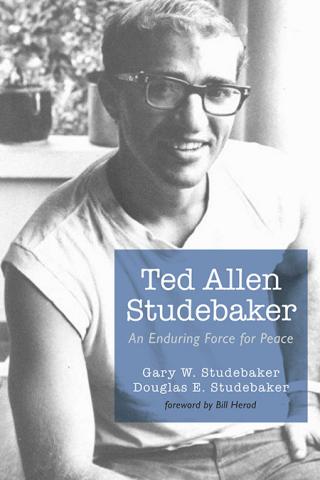Alumnus biography an enduring message of peace

Born on a busy farm in Ohio with his parents and 7 siblings, Ted Studebaker would grow up amidst a culture centered around strong work ethic and the values of family and church participation. In this environment, there was never a shortage of hard work, raising and caring for the family’s various livestock and crops. The biographical book Ted Allen Studebaker: An Enduring Force for Peace, written by his brothers Gary and Douglas Studebaker, would begin with childhood stories of Ted, their siblings, and the farm. The book, published in 2017 honors Ted’s life and life’s work. But it is not just a retelling of Ted’s life told through anecdotes, facts, and dates. It is a reflective and questioning piece exploring Ted’s experiences that led him on a path of service and to face injustice. A life path that would lead him into Vietnam in 1969 as a conscientious objector.
“Expressing his values and belief system, coupled with his open-mindedness and ready dialogue, Ted was never one to hold back from taking action on issues he knew to be right and true,” his brother Ron Studebaker said in the book. He describes a brother that from an early age showed a precociousness and independence of mind that would be reflected in his strong commitment to living his values.
His undergraduate experiences at Manchester College, majoring in sociology and psychology helped shape his interest in working for peace and human rights. In a philosophy class paper, he wrote: “Perhaps the words to this verse of a folk song which speaks of Gandhi can best relate my values and feelings as a C.O. [conscientious objector] and pacifist.
‘Gandhi spoke of freedom one night,
They said, man you’ve gotta fight.
He said yes, but love’s the weapon we must use.
For with killing no one wins,
It’s with love that peace begins,
We’re all brothers, and we’re only passing through.’”
Ted believed wholeheartedly in his ability to serve as a conscientious objector as an alternative service worker, and by the end of his senior year at Manchester, he selected to join the Vietnam Christian Service once he completed his graduate studies. He knew his calling to be in social work, and in 1967 he started the two-year Master’s Program at the FSU School of Social Welfare. During his time at FSU, he worked at a clinic with mental health patients and expressed an interest to work in this area.
His friend Joel Freedman would remark in the book, “His ideals reflect the finest qualities of human spirituality. Such qualities must not be lost in today’s difficult times.” Friend and fellow FSU alumnus Lou Pagliuca also remembered Ted, “as a multi-talented man who had deep convictions about the world we live in” that also shared his enjoyment of athletics and music, singing songs of peace, justice, and hope during his time at FSU. Lou would also go on to serve his country as a Clinical Social Work Officer for the United States Air Force.
Days after graduating from FSU in 1969, Ted began training with Brethren Volunteer Service and then quickly joined the Vietnam Christian Service (VNCS) as an agriculture volunteer working primarily in the Di Linh area of Vietnam. Ted would be confronted with the disparities between rich and poor during his journey through Asia, along with the challenges of learning new cultures and languages and facing the negative perceptions of Americans. He also met his wife, Pakdy, another VNCS volunteer. They married on April 21, 1971. Only nine days later on April 26, 1971 the, e was a mortar barrage attack on the house he, Pakdy and other VNCS colleagues shared. He was able to help the other three workers into the closet bunker in the house. But tragically Ted was shot and killed by attacking soldiers.
Although many questions remain surrounding Ted’s death, his brothers that would author the book about him would discover the lasting impact that Ted’s life would have on people that knew him. Many VNCS volunteers and relatives of Ted’s would pilgrimage to areas of Vietnam where Ted and the VNCS worked in later years. The book overflows with stories, anecdotes, essays, and memories, ensuring a legacy for Ted Allen Studebaker and his message of peace and justice – a message that he may not have anticipated, but none the less gave his life for.
“Ted was a quiet, resolute young man who contributed more in his short lifetime to what the world should be like than most of us have accomplished in our many years of professional social work practice/endeavors. Ted’s legacy of unselfish service to others in the face of ultimate danger hopefully will be emulated by future generations of social work colleagues,” Lou Pagliuca concluded.
To purchase a copy of the book Ted Allen Studebaker: An Enduring Force of Peace, click here.
